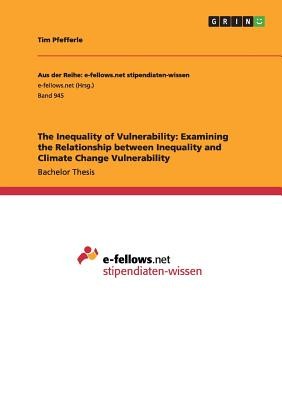
- We will send in 10–14 business days.
- Author: Tim Pfefferle
- Publisher: GRIN Verlag
- Year: 2014
- Pages: 56
- ISBN-10: 3656686246
- ISBN-13: 9783656686248
- Format: 14.8 x 21 x 0.3 cm, softcover
- Language: English
- SAVE -10% with code: EXTRA
Reviews
Description
Bachelor Thesis from the year 2014 in the subject Politics - Environmental Policy, grade: 72, Queen Mary University of London (School of Politics and International Relations), language: English, abstract: Inequality and climate change have emerged as dominant themes of political and social enquiry. This study aims to link these two themes to develop an understanding of the interrelationship between inequality and climate change vulnerability. How does inequality shape vulnerability among different socio-economic groups? How is the vulnerability-inequality nexus related to the process of globalization? A number of negative outcomes of inequality are associated with factors contributing to climate change vulnerability. These will be traced within a discussion of two case studies focusing on Papua New Guinea and Tonga, two countries facing enormous climate risks. The study finds that globalization creates particular environments in which climate change vulnerability may be facilitated in the absence of targeted measures. These environments are particularly susceptible to the negative implications of inequality. Thus not only is inequality problematic from the perspective of access to resources, but also in the sense that political and social institutions are less responsive to the most vulnerable segments of unequal societies. In particular, the issues which create vulnerable environments are related to formal and informal social security as well as urbanization.
EXTRA 10 % discount with code: EXTRA
The promotion ends in 13d.21:01:54
The discount code is valid when purchasing from 10 €. Discounts do not stack.
- Author: Tim Pfefferle
- Publisher: GRIN Verlag
- Year: 2014
- Pages: 56
- ISBN-10: 3656686246
- ISBN-13: 9783656686248
- Format: 14.8 x 21 x 0.3 cm, softcover
- Language: English English
Bachelor Thesis from the year 2014 in the subject Politics - Environmental Policy, grade: 72, Queen Mary University of London (School of Politics and International Relations), language: English, abstract: Inequality and climate change have emerged as dominant themes of political and social enquiry. This study aims to link these two themes to develop an understanding of the interrelationship between inequality and climate change vulnerability. How does inequality shape vulnerability among different socio-economic groups? How is the vulnerability-inequality nexus related to the process of globalization? A number of negative outcomes of inequality are associated with factors contributing to climate change vulnerability. These will be traced within a discussion of two case studies focusing on Papua New Guinea and Tonga, two countries facing enormous climate risks. The study finds that globalization creates particular environments in which climate change vulnerability may be facilitated in the absence of targeted measures. These environments are particularly susceptible to the negative implications of inequality. Thus not only is inequality problematic from the perspective of access to resources, but also in the sense that political and social institutions are less responsive to the most vulnerable segments of unequal societies. In particular, the issues which create vulnerable environments are related to formal and informal social security as well as urbanization.


Reviews